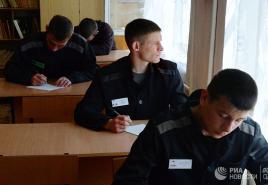How do I do my homework. How to do homework quickly: top tips
Today we will talk with you about how to quickly do the lessons. After all, it is this question that worries many students, if not all students at all. Now in many schools there are so many homework assignments that the children have no time left either for rest or for self-development. Let's try to help them.
Preparation is the key to success
Well, if you want to understand how to quickly do the lessons, you will have to pretty well prepare for this lesson. For starters, before you start solving problems, it is recommended to eat and rest. At least 30-40 minutes. In this case, the brains will receive a small discharge, which contributes to a good assimilation of the material.
In addition, if you want to know how to quickly do your homework, you will need to find a quiet and secluded, as well as a convenient place for you, where no one will "pull" and interfere. Usually this place is in your room, at the table. Warn everyone not to touch you, and then proceed to solve puzzles. This is how you can quickly cope with any homework. Especially if you are really well prepared. But there are some other pretty interesting ways that will help answer the question of how to quickly do the lessons. And now we will get to know them.
Ask for help
Well, the next scenario is not entirely fair. However, like all the future. After all, speed depends on your knowledge and training. In the absence of these, you will have to resort to tricks.
Do you want to know how to do the lessons quickly and correctly? Then ask for help with "homework". It can be older family members, friends, parents - anyone. Teachers, after all. In the worst case, you will be re-explained the material necessary for solving, and at best, they will help you quickly solve everything and write.

True, now a fairly common move that helps to learn how to do lessons in mathematics or any other subject is to order "homework" online. You pay a small amount, and everything is decided quickly for you. No one will know who is doing the work. And you will not be familiar with the so-called performer. True, this move will not add knowledge to you. You can use this technique only in extreme cases. For example, if the teacher is very strict, and for health reasons or family circumstances you did not have the opportunity to do your homework. But there are a number of rather interesting approaches to our today's question. Which ones? Let's get to know him soon.
Writing off at recess
How to do homework in 5 minutes? Of course, the fastest and most accurate answer here is a banal copying of the solution from a friend-classmate, and right at recess. Or before class.
It is this technique that allows students to "solve" tasks very quickly. In a hurry, you should rewrite everything that your friend has in his notebook regarding homework. It will be possible to deal with everything right in the lesson or during the answers of other students.
Yes, this is also far from the most honest and good scenario. However, cheating is very common in schools. If you have time, then arrange your homework the way you do it yourself - see that the "homework" does not look copied one to one. After all, you can simply be suspected of cheating. Not a very pleasant outcome, right?

Resources to help
And here is another good answer that can be given to the question: "How to make lessons in 5 minutes?" This is nothing more than the use of reshebnikov. In fact, this method is not as bad as it might seem at first glance. It has a number of significant advantages that previous methods do not have.
The first thing you should pay attention to is that in the solution books, as a rule, all the material is "chewed". That is, if this is a solution to the problem, then it is necessary with all intermediate actions. So, having copied several times, the student will understand how to solve similar problems, and will be able to cope with them on their own.
The second point is choosing the right solution. Now for each year and even edition there is an assistant. As a rule, if you choose the wrong option, then you will not have a solution. Or it will be different from what is required in reality.

It is also worth considering that some tasks are now written and compiled in such a language that sometimes even an adult is not able to understand them. The solver will help you figure out what's what, and also allow you to answer the question of how to quickly do the lessons.
Mathematics teacher, participant of the Teacher for Russia project Alexander Yadrin told Letidor how schoolchildren should do their homework correctly.
The main goal that the teacher is guided by when he gives a homework assignment is to consolidate the student's knowledge in a particular subject. In order for homework to not cause irritation and be easier, you must follow a few simple rules:
You have to sit down for lessons right after school.
According to the research of the German psychologist G. Ebbinghaus, for better memorization, the student must repeat the material covered in the lesson, observing certain intervals of time (immediately after studying, after 20 minutes, after 40 and after 8 hours).
By the end of the last lesson, the student barely has 40% of the material that he studied at the beginning of the day. So you need to sit down for homework immediately after class, until the knowledge learned during the day has completely disappeared from your head.
I think that for an elementary school, an excellent option is to do after-school lessons (provided that there is a calm atmosphere and the children do not “stand on their ears”). They just went through the new material and immediately after the lessons they fix it. As for middle and high school, it is possible to do homework in the office of the class teacher or subject teacher.
What happens when a child does homework in the evening or even a few days after he received it? By the time the student sits down for lessons, he does not remember more than half of the theory. There is no motivation for classes, since you have to go into the textbook, look for the right paragraph, remember the rules - strain more than expected. It’s easier to write off from the solver or from a neighbor on the desk.
If after school the child has a circle or section, it is better to do homework in the morning the next day
Very often, children go in for various sports in parallel with school. For example, when I was a schoolboy, I went to volleyball and basketball sections. After them, I returned home at 10 pm, I didn’t have the strength for the lessons at all.
Thanks to my parents who treated me with understanding and intuitively made the right decision. Since they left for work very early, they woke me up at five in the morning, I arrived at school at seven. I had exactly an hour and a half to do my homework. And I did great. It is very good to think with a fresh mind. Of course, doing homework in the morning is more difficult than immediately after class, but much better than in the evening, when you feel sleepy.
Start with your favorite subject
If a student starts doing homework with an unloved subject, this will most likely make him irritable. This means that he will lose motivation for learning, and he is unlikely to want to continue. Therefore, it is necessary to take lessons from favorite tasks.
When you start with your favorite (easy) item, it gets faster. I took some simple topic, read it quickly, did the exercise - and the first homework is ready. There is a positive reinforcement of the case - success, and the child takes up the next lesson with interest.
Divide your homework into rounds of 25 minutes.
The teacher condemns his subject to hatred if it takes more than 20 minutes to complete homework on it. By the way, even according to SanPiN, on average, homework in one subject should not take more than this time.
One of the rules of time management is that the task should be divided into rounds of 25 minutes each, with small breaks (5-7 minutes) between them. Invite your child to set a timer on their phone for 20-25 minutes and focus on the subject as much as possible during this time. When the time is up, it is important to put the textbook aside and take a break (also on a timer so that there is no temptation to be distracted from the lessons). Then, with renewed vigor, take on the next task.
Maximum concentration of attention is achieved through a constant change of activities
In elementary school, a child can concentrate for at most 5 minutes. In the middle and senior - 10 minutes. To make the lessons more productive, the student needs to regularly change activities. Maximum concentration is achieved by changing intellectual and physical activity. In short breaks between rounds, he must fully rest. You can jump, run, do push-ups, squat. You can sing a song - it perfectly relieves stress and helps to switch.
It is important to remember: if the child does not like the subject, then he does not understand it. The task of the teacher and parent is to make the lesson applicable to the interests of the child. For example, if physics is very poor but basketball is good, combine the two. Learn the laws of physics by watching the ball - tell us how the kinetic energy of the ball is converted into potential energy when thrown. If there are problems with the geometry, you can calculate what the angle of attack in basketball should be in order to throw into the ring as accurately as possible.
You can always find an approach to a child if you communicate with him through his interests. Once a high school student came up to me and complained that she did not want to learn English, since it is unlikely to be useful to her in her chosen profession. The girl dreamed of becoming a cook and was sure that she would only need French. I suggested that she watch Jamie Oliver cooking shows in the original language. We met a month later. She said that she already understands English quite well, since the programs with Oliver captured her so much that she had to improve her knowledge in the language.
She watched the show with great interest because she wanted to realize herself in her chosen profession. Thanks to such activities, the student improved not only the lexical base, but also pronunciation, culture and the basics of professional ethics.
The discussion around homework always remains inexhaustible. Many believe that homework should be abolished altogether - let schoolchildren enjoy their childhood. Nevertheless, a competent teacher is always looking for a way to get interested in the subject - and in part, the student's homework can help the teacher in this. After all, when a student understands a subject, he loves it.
"Lessons" - this word often causes nervous tension not only among the student, but also among all household members. Especially if the baby is an elementary school student, when discipline has not yet been established and he has not learned how to cope with his tasks. To prevent this from happening, starting from the first grade, it is necessary to accustom the child to some basic rules for doing homework. This is necessary so that the learning process does not turn into a difficult routine for the whole family, and not the child, but the mother was waiting for the weekend.
Correct daily routine
The first task of a parent is to establish strict discipline and regime in the house. This does not mean at all that you need to walk in formation and sing marching songs, it is about the fact that the child knows what and when he will do. He will learn to plan and calculate his efforts. At the same time, it is imperative to take into account some principles of physiology that even a very diligent baby will not overcome. For example, after lunch, the child will need a little time to rest. An example daily routine should be:
- the child woke up;
- made the bed, washed, brushed his teeth;
- had breakfast;
- got dressed;
- went to school;
- returned from school, changed clothes;
- had lunch;
- rested for about an hour;
- sat down to do homework;
- rested;
- had supper;
- packed up things for tomorrow;
- went to sleep.
The task of the parent is to correctly distribute the learning efforts during the day. The child should be well versed in his schedule and know what he will do in the near future.
Distribution of efforts
In order to do everything faster, homework assignments are divided by difficulty. Mathematics is always done first, as it requires the greatest concentration, the last - drawing, crafts. Do your homework in the following order:
- Mathematics, written assignments.
- Reading.
- memorization.
- Creative tasks.
The heaviest is at the beginning, more creative and “for relaxation” at the end or between tasks. In addition, we must remember that tasks that require constant repetition and memorization are learned during lessons, and then reminded during the day, at breakfast and at any other time.
Hall help
All teachers and psychologists recommend helping a child in the first grades with homework. At the same time, the degree of help from others should be strictly dosed. In this case, you can’t just turn away and not help, but controlling every step is bad. It is best to distribute tasks and teach the child independence. Every parent knows what a student has problems with. Therefore, before doing lessons, it is necessary to distribute tasks according to the degree of complexity. And each difficult lesson must be done according to the principle:
- read the rules
- trying to do it yourself
- If you don't understand, I'll explain.
At the same time, it is necessary to determine when the child really cannot cope, and when he is simply too lazy to figure it out. In the first case, it is necessary to explain, in the second, to push for independent work.
Silence and motivation
It is not for nothing that all the norms state that the child should have his own corner for classes. Before doing homework, he should focus on the task at hand and not be distracted. Therefore, the student needs to provide a place for classes, remove all unnecessary gadgets, turn off the music and TV. At this moment, you need to agree with the household so that they put aside their noisy business, if you really want to watch a movie or play a game, this should be done with headphones.
You should never forget about motivation, the child must understand why he is doing all this. Having learned how to do homework quickly, the kid will be able to devote more time to his favorite thing - to play, read, communicate with mom or watch TV with dad.
Probably, parents often hear from their children: “May I not go to school today.” Usually students say this because they didn't do their homework. Do not immediately scold the child. After all, you can use the advice of psychologists.
All children sooner or later start to get bored with their studies. According to the schoolchildren themselves, it's all about the homework that the teachers ask. After all, it is very difficult to do lessons in several subjects at once in a day. Moreover, teachers load with additional classes, for which they also give homework. However, teachers do not take into account the fact that students can go to any sections or circles. Sometimes there just isn't enough time for everything. Especially if they are young children and teenagers. But what if you can't reach an agreement with the teacher? Or how to learn to do homework on time? There are two exits. The first is to go to another school. But it is unlikely that there will be less loads. The fact is that the teacher leads the lesson according to the curriculum. Therefore, blaming or blaming him for doing too much homework is not reasonable. And the second way out is the correct distribution of time. It is also very important to know how to complete tasks faster. This will require knowledge, skills, patience, attentiveness and desire.

Scientists say that the best time for lessons is 16:00-18:00 hours. However, this time is very short to do all the homework. But it is also important to consider how many tasks were given in general. After school, the child should be fed immediately and allowed to rest for 30-40 minutes. It is advisable to indulge in chocolate, because it activates the brain and improves mood. After that, you need to sit next to your child and ask what they asked for tomorrow. Sometimes it happens that a student deliberately forgets to write assignments in the diary. You can find out by calling all your classmates. In extreme cases, you will need to call the teacher. The child must understand that this is very important. And if he does not write down at school, then at home he will still have to find out somehow.
When the student has learned the tasks, it is necessary to start them immediately. First you need to do written lessons, and then oral. If you need to learn something, it's best to do it last. Otherwise, nothing will be remembered.

Psychologists advise parents to do homework with their children. Especially if they are in elementary school.
It is advisable to start doing lessons with mathematics. It is very important to observe the actions that the child does. You have to watch how he writes and how he thinks. If somewhere he did something wrong, then it is necessary to point out the errors. You need to give him the opportunity to find errors on his own. It is strictly forbidden to allow the use of a calculator for calculations. After that, the brain stops thinking. And in high school, in general, then it will be very difficult with mathematics. Therefore, the best thing is the independence of the child. It is advisable to teach a small household the multiplication table before school. It will be easier for him to cope with tasks in the future. After the child has done the math lessons, you should carefully check. Psychologists recommend the first time to find fault with everything, especially handwriting. thus, the student will try to do better. And in the future already nit-picking themselves disappear. Rest breaks also need to be taken. But no more than 5 - 7 minutes. Otherwise, laziness may appear and you will no longer want to continue.

Further it is desirable to pass to Russian. At school, they can give tasks such as writing an essay, presentation, or you need to do some kind of exercise and tasks for it. The first thing you need to do is talk to your child. He will express his thoughts. After that, it will be easier for parents to understand what is difficult for the student. Perhaps this is ignorance of the plan of composition and presentation. Sometimes the problem lies in the student's not very good memory. It can also be difficult to write down your thoughts on a piece of paper. Well, and, of course, difficulties can arise with ignorance of the elementary rules of the Russian language. In this case, parents must definitely explain to the child what is not clear. After that, ask him to read the assignments carefully. Do not scold the student if he did not understand the first time. You have to explain and read until you understand everything. Perseverance and strength of character are very important here. The student needs to be clearly explained how important study is now. After all, young children have a simple psychology. They need to be constantly told what is important at the moment. Then these words will linger in their thoughts. The child will already treat everything more responsibly.
After mathematics and the Russian language, one must proceed to literature. Teachers like to give such tasks: retelling, answering questions, learning a poem by heart. It happens that they can give some creative tasks, but this is rare. Psychologists recommend monitoring children's reading. The student must read aloud every day for 2-3 hours. Moreover, if he did not understand what the story was about, he should read it again. After that, you need to ask him to tell the content of this story. Feel free to ask any questions. For example, “Which character from the fairy tale did you like the most? ". There must be exact confidence that the student understands the essence of what is stated in the book. Parents can also read to the child, but this is the case if he is very tired.

Big problems still arise with the study of foreign languages. In many schools, these lessons have been introduced since the elementary grades. Here parents need to be extremely careful. It is necessary to interest the child in this subject. That is, to explain that if he goes on a trip, he will need to speak another language. And if he skips the lesson now or doesn’t understand something, then it will be difficult to understand everything later. It is desirable, of course, to squeeze the child into additional classes in the study of a foreign language. But it is best that this place is not a school, but some kind of special educational institution where languages are taught to young children. So the student will adapt to new places, people and environments.
According to psychologists, this technique for lessons is very effective. But that's just unlikely it will affect those who study in middle and high school. In children aged 13-18, youthful maximalism works. They do not intend to obey anyone, and even more so to sit at the lessons with their parents. Most children, when they move to 7-8 grades, simply stop doing lessons. It's hard to convince them of anything. Therefore, it is necessary to teach love to study from an early age. And if a student asks for help in the lessons, then it is strictly forbidden to refuse him. Otherwise, he will simply quit all training sessions and start doing completely useless things.
So it is worth paying attention to the progress of the child in school. Moreover, the first time you need to find out from teachers about his activity in the classroom. Then, based on this, you can somehow help the student's performance in terms of learning. Therefore, it is necessary to be interested in the affairs of your child!
It turns out that the question of how to learn quickly, to do homework has a wide variety of answers. Therefore, it is foolish to complain that it is difficult for a child to give any lessons. The main thing is a great desire, then everything will work out!
How to teach a child to prepare homework just in time so that he does not have problems at school? An article for independent children, responsible parents and caring teachers.Time management - or the ability to manage your time - has long been one of the leading competencies of a modern person. It is most difficult for a child to cope with planning, especially if parents cease to control his every step.
Preparing homework is a headache for both the child, and parents, and teachers. The child does not have time to do anything or forgets everything, parents learn that they need to prepare crafts for tomorrow's technology lesson at 10 pm, and teachers may simply have nothing to check at the next lesson.
We have prepared for you a material dedicated to drawing up a plan and working on homework. And at the end of the article, you can download two bright weekly planners that will help the guys distribute the load and do their homework efficiently and without panic.
Planning and setting time for homework
Determine how much time your child has for homework after school.
For example: 2 o'clock on Monday, 3 o'clock on Tuesday, one hour on Wednesday.
Recall! The Ministry of Education has determined the amount of time a child should spend on homework. In the first grade there should be no homework, in 2-3 it is an hour and a half, in 4-5 grades - two hours, in 6-8 - two and a half hours, and from 9th to 11th grade the student must spend on homework no more than 3.5 hours a day.
The schedule will help you understand exactly when and what can be scheduled. On those days when the student has additional classes, for example, a music school, English or wrestling, there will definitely be less time, and this is worth considering.
On a large scale, the scheduler can be downloaded at the end of the material.
Think: can you use the morning?
If the child is very tired at the end of the day, then definitely you should not force him to do everything in the “if you didn’t do it, you won’t lie down” mode. Move the task from evening to morning. With high school students, such a system works with a bang, as well as with students: let the child go to bed, but set the alarm an hour or an hour and a half earlier. In the morning, thoughts will be fresh, and there will be enough energy for conscious reading of the chapter and even solving problems.
Travel time
If the child gets to school by public transport, then he will have extra time to prepare. But this item can by no means be called obligatory or even positive, only a spare. It is absolutely impossible to write in a notebook while in a rocking minibus or tram, but to read the necessary paragraph again is completely.
Magic Friday
On Friday, I especially want to do nothing more after the end of the lessons. But it really is a magical time that should be used to the maximum. Ahead of the weekend and the opportunity to sleep, which will add a few points to the treasury of good mood.
You don't have to wait until Sunday evening to sit down to do your homework in sadness. Better try to do it all Friday night. So the child will free himself all weekend, and instead of two days loaded with examples, reading and spreadsheets, he will get two days of free time for hobbies and favorite books.
We find out what needs to be done and what resources are needed for this
make a list
The first step is to make a list of everything you have to do this week. Essays, tasks, playing football on Thursday, additional assignments from foreign language courses - absolutely everything. So it will be easier to find out how best to “scatter” everything you need throughout the day. If you have a relatively free day, it is better to schedule the preparation of a non-urgent (for example, from Monday to Thursday) task for it so that you do not go to bed after midnight on Wednesday.
The exact wording of the task
Another “Sasha, hello! And what did they ask us in mathematics, otherwise I didn’t write it down? means only one thing: the waste of precious time. Teach your child to always write everything down.
Also, when planning your homework, it is better to use the following table (you can download it on a large scale at the end of the material):
Subject (Russian or Algebra)
Assignment (specific text of the teacher)
Format (essay, presentation, project)
Special details (what can I use, double sheet or single, what colors)
Deadlines (when to submit)

Execution time
Estimate how long it will take to complete each individual task. It's better to be realistic and mortgage more than less. If the child completed the task earlier, you can reward yourself with a break or start the next part to finish earlier. Such gamification - "struggle" with oneself - perfectly motivates.
Prioritize
If you know for sure that you will have to tinker with the essay longer than with examples, then it is better to start with examples. Yes, experienced time managers advise you to “eat the frog” first, that is, to do the most unpleasant thing, but this will not work with the lessons. The child will get frustrated, exhausted, and lose all desire to do anything else.
We propose such a plan: first we write the structure of the essay, that is, the reference points of the narrative, while the thought is fresh. Then we solve examples or problems (algebra, physics, chemistry - what is included in the list of favorite subjects). And then, with a sense of pride in ourselves, we begin to write an essay, the outline of which is already ready.
Checking
It is best to hang the schedule in a conspicuous place, and put reminders on the time of the most important tasks on the smartphone, which is in the pocket of almost any student. Every time you have a desire to scroll through the VKontakte feed or play a computer, it is better to check the schedule. Having a schedule, but completely unwilling to follow it, will nullify all efforts.







